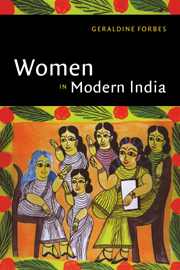Book contents
- Frontmatter
- Introduction
- 1 Reform in the nineteenth century: efforts to modernize women's roles
- 2 Education for women
- 3 The emergence of women's organizations
- 4 The movement for women's rights
- 5 Women in the nationalist movement
- 6 Women's work in colonial India
- 7 A time of transition
- 8 Women in independent India
- Bibliographic essay
- Index
- THE NEW CAMBRIDGE HISTORY OF INDIA
- References
1 - Reform in the nineteenth century: efforts to modernize women's roles
Published online by Cambridge University Press: 28 March 2008
- Frontmatter
- Introduction
- 1 Reform in the nineteenth century: efforts to modernize women's roles
- 2 Education for women
- 3 The emergence of women's organizations
- 4 The movement for women's rights
- 5 Women in the nationalist movement
- 6 Women's work in colonial India
- 7 A time of transition
- 8 Women in independent India
- Bibliographic essay
- Index
- THE NEW CAMBRIDGE HISTORY OF INDIA
- References
Summary
Rammohun Roy's (1772–1833) name is usually listed first among those of nineteenth-century reformers concerned with improving women's status. Historians have called him the ‘father of modern India,’ a ‘champion of women's rights,’ and a feminist. But his personal relationships with women were far from ideal. He was married three times, at age nine, ten, and twenty-one years. His first wife died soon after the marriage, another died in 1826 and one outlived him. There is no evidence that he looked to his wives for companionship; in fact, there were rumors that his adopted son, Rajaram, was the child of his Muslim mistress. After Rammohun's father's death he argued with his mother, Tarini Devi, and in anger left the family home with his wives and children. The relationship deteriorated even further when Tarini Devi encouraged a nephew to challenge Rammohun's right to ancestral property. The suit began in 1817. Among the court records is an unused document showing that Rammohun was prepared to argue, in front of a judge, that his mother hated him, desired his worldly ruin, and would have even ‘welcomed his death.’ Rammohun had developed a set of questions to be asked of his mother if she were called as a witness. He planned to ask if she was so angry at him for refusing to worship her idols that she would lie under oath to destroy him. Rammohun admitted he admired his mother's strength and independence yet he was willing to publicly humiliate her. Examined from this perspective Rammohun seems less than an ideal champion of women's rights. Where were women's voices?
- Type
- Chapter
- Information
- Women in Modern India , pp. 10 - 31Publisher: Cambridge University PressPrint publication year: 1996

